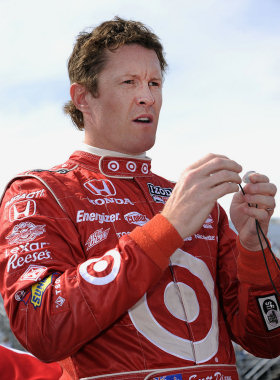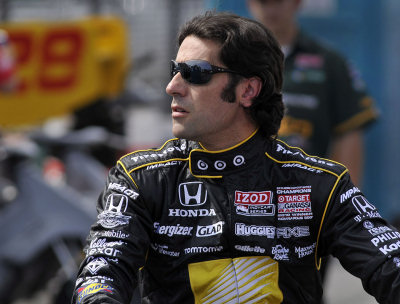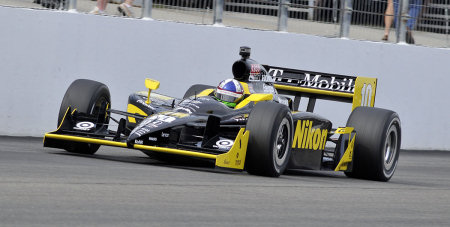The Way It Is/ The men to beat in IndyCar
by Gordon Kirby This is the fourth straight year in which Chip Ganassi's Target Indy cars have been the ones to beat. Scott Dixon won both the Indy 500 and IndyCar title in 2008 while Dario Franchitti took the last two IndyCar chapionships and the 2010 Indy 500. This year Franchitti and Dixon have won six races between them and are first and third in Izod IndyCar points. They also dominated the Indy 500, one or the other leading most of the way only to be confounded and disappointed by fuel and strategy errors.
This is the fourth straight year in which Chip Ganassi's Target Indy cars have been the ones to beat. Scott Dixon won both the Indy 500 and IndyCar title in 2008 while Dario Franchitti took the last two IndyCar chapionships and the 2010 Indy 500. This year Franchitti and Dixon have won six races between them and are first and third in Izod IndyCar points. They also dominated the Indy 500, one or the other leading most of the way only to be confounded and disappointed by fuel and strategy errors.
Before last weekend's return of IndyCar racing to New England after a thirteen-year absence I talked to Franchitti and Dixon about their season so far and hopes for the future. Competitive as both of them have been in most races this year Franchitti believes their strongest year to date was 2009, his first year with Ganassi.
"I would say in 2009 we were strong everywhere," Franchitti said. "We felt we could have won almost every race that year. Last year wasn't as good. We struggled at the road and street courses. We were definitely a little down on performance on those tracks.
"We started off this year well. We won the first race at St. Pete but at Barber we weren't quite there. We were strong on the ovals but then we did a test at Sebring at the end of June and Scott found some stuff he really liked."
Dixon sees things a little differently.

© Gary Gold
Indianapolis was a big letdown however with fuel level mistakes made in qualifying and the race.
"We've won a lot of races this year for a lot of different reasons," Franchitti remarked. "We've won some and we've missed out on others. Indy was very disappointing. It was definitely not a high point."
Dixon rues the mistake that sent him out for his last stint with too little fuel in his tank to run hard to the finish.
"Dario's situation was a strategy call. It could have gone either way," Dixon observed. "But mine was just stupidity--an absolute, plain mistake. They missed six-tenths of a second of fuel. My closest competitor was Dan (Wheldon) who was eight seconds behind me. But even in qualifying a mistake was made. So that was a very disappointing month."
Franchitti emphasized how difficult it is to run a perfect race.
"The tough thing about racing in general is whether it's the driver or the team--whoever it is--everybody's working for perfection all the time. It takes that perfection in all departments to win a race. But Indy was hard."
Dixon stressed that the chances are few and far between of a team dominating at Indianapolis.
"It's rare that you get both cars working that well," Scott remarked. "It could be another three or four years before you get yourself in the same situation where both cars are super strong and you've got the speed and all the little boxes ticked."
Franchitti added that the 2009 Indy 500 was almost identical.
"We had the speed and the boxes checked in ‘09," he said. "We both led a bunch of laps between us but we had bad pitstops. This year we had the same thing as ‘09. We had super strong cars but mistakes were made.
"It's part of it ‘though," Dario added. "It's funny. A.J. said to me before the race, ‘You know, I've won four here,' he said. "Probably of couple of those four I shouldn't have won, but a couple of the races I should have won I didn't win.' He said, ‘When it's your day here, it's your day. It doesn't matter how fast your car is.' And after the race I thought, ‘Man, that's right. He really knows the place.'."
Franchitti and Dixon are confident they will maintain their high level of competitiveness through the end of the season.
"We're always doing development," Dixon noted. "We're constantly changing, just trying to keep up with it all."
Franchitti added that Dixon was in a class of his own at Mid-Ohio from the start of IndyCar's pre-race test session at the track.
"We tested at Mid-Ohio and from the first lap Scott was comfortable in the car. He was driving well and had that rhythm between him and the car, and at the race he was in his own zone."
Dixon says he takes particular pleasure from road courses like Mid-Ohio.
"I like the older American tracks," he said. "Watkins Glen, Mid-Ohio and Road America are a lot of fun. There's just a lot of flow to those tracks. I've learned a lot from Dario on street courses which has helped a lot. But there are places you enjoy going to and know you're probably going to have a good car and for me Mid-Ohio is one of those tracks."
Dixon adds that the physical effort of racing at Mid-Ohio doesn't bother him, helped by having a good-handling car.
"You don't get much of a rest at Mid-Ohio but physically it's not bad. But, especially when you go there for the first time, you're really holding on. But when you get a real nice rhythm and the car feels good you don't have to physically push as much."

© Gary Gold
"When we had a thousand horsepower and a tire war we still couldn't pass at Mid-Ohio," Dario observed. "The good thing is the new owners are talking about changing certain corners to make more passing places and make it safer too--not change the character of the track but make it so there's a little more room to pass."
Franchitti and Dixon continue to develop their close working relationship as teammates and friends.
"When I came here in 2009 my biggest worry was having had a year away," Franchitti related. "I literally thought, ‘Will I be able to compete with Scott?' He had just won and dominated the 2008 championship and Indy. He'd blown everybody's doors off and I thought it was going to be tough. But when I came on I was able to hold my own and contribute and I think on the ovals and even on the road courses Scott taught me a lot.
"It's interesting because some of that stuff Scott learned from Dan (Wheldon). It's kind of circular. I taught Dan some stuff and he learned some stuff on his own that he taught Scott. And on the street courses I was able to give him my way of setting the car up and also of driving it. Week in, week out, we find we're learning from each other and we're pushing each other."
Dixon pointed out that they had opposing strengths at Milwaukee this year.
"Dario was miles quicker in (turns) one and two and I was miles quicker in three and four. If you put our laps together we could have had pole by three or four-tenths. So we both learned from each other."
Franchitti says Mid-Ohio provided a similar element.
"At Mid-Ohio there were two corners where Scott was just smoking and there were three corners I had nailed and we tried to add those together. So we're still learning from each other at every race. The good thing is both of us can say, ‘He's doing a better job than me and I've got to learn how to do that.'
"We're very competitive. We want to beat each other and we're quite comfortable with that. There's nothing hidden. It's very open between us."
Of course, Ganassi is running an additional ‘junior' team for the first time this year for Graham Rahal and Charlie Kimball. Franchitti says it's interesting to watch the relationship evolve between the two teams.
"I think the more they run and the more experience that both Charlie and Graham are getting the more they're contributing. But right now it's still very much a one-way street. They have access to all our information, setups, overlays and equipment--everything--and we have access to their stuff.
"Right now we're finding those guys are going more and more to our setups and looking at our data. But as time goes on those guys--the engineers and especially the drivers--will start to contribute more. There are teething problems, as there always are, but the teams are still very separate."
Franchitti says there's nothing new about the fierce rivalry he's having this year with Will Power. He says this kind of thing has been going between drivers for many years but the difference is that the battle between Power and he has broken out off the track.
"I think the series love it," Dario observed. "They love that rivalry. But I've been explaining to people that we have had that rivalry on the track since long before I showed up in IndyCar racing and we've managed to do a very good job of keeping that rivalry on the track. In some ways I think people see that as a lack of rivalry because they don't see us getting out of the cars and shouting at each other.
"I think most of us are of the opinion that you go out there and race and if you get beaten you come in and say, ‘Good job.' Whatever happens on the track, you get over it.

© Gary Gold
"But I'm over it. For me, it makes no difference how I race people whether it's my teammate or my friends TK or Marco or whether it's somebody who I'm not particularly speaking to. Will and I have chatted a couple of times but these things will happen with hard racing."
As we talked Dixon sat there grinning about the whole affair.
"Like I said, I thought it was hilarious, especially when Will used the word ‘wanker'. I didn't even think you could day that word over here in this country. I thought it was funny as hell.
"I think the media kicks it off," Scott added. "But I think it's better for TV that you show your true colors. People like it. It was good stuff for Will to get out of the car and be a little bit pissed off. To call everybody wankers was just perfect for the show. Maybe that's not what he would have done thirty minutes later, but I think it's good for the show."
Finally, we talked about their hopes for the new Dallara which has started testing with Dan Wheldon and Bryan Herta's Indy-winning team.
"I hope it's got more power," Franchitti declared. "I hope it's got more of that kick in the back we used to have with the turbos. Obviously, we want it to be a safer car, but certainly we want it to be a faster car."
Dixon emphasized the importance of making sure the car is more raceable than the current package.
"The racing side is what's important," Scott said. "We need more power and I think the cars need to be trickier to drive in a racing situation. At some tracks at the end of the race you're running pretty close to your qualifying speed and there should be a performance drop-off for the driver to deal with. That'll also make the racing more exciting.
"I don't know what they're doing for the superspeedway package. I'm guessing the short tracks will be the same configuration as the road courses and I guess it's got bigger tunnels, which is good because that should help the racing."
For my part, I believe the car needs to be an overpowered beast with 900 or 1,000 bhp. That's what always differentiated an Indy car from a Formula One car. For many decades an Indy car had too much power for its chassis and aerodynamics to properly contain. It was a beast to drive and therein lay the lure and attraction for both drivers and fans.
"You're absolutely right," Franchitti said. "You talk to any driver and we want power. The problem is that on the 1.5-mile and 2.0-mile D-shaped ovals the cars aren't compatible with those tracks. They're great tracks but they're not really compatible with Indy cars in my opinion. Even when we go back to the days ten years ago when we had all that power at places like Fontana the cars just didn't really fit those tracks.
"But I think Scott's right," Dario added. "As much as we want them to be a beast to drive, it's the racing aspect that's the most important thing--that the cars can race together."
Here's hoping--against the odds--that IndyCar finds the right formula for next year's cars and engines.
Auto Racing ~ Gordon Kirby
Copyright 2011 ~ All Rights Reserved
Copyright 2011 ~ All Rights Reserved
Top of Page